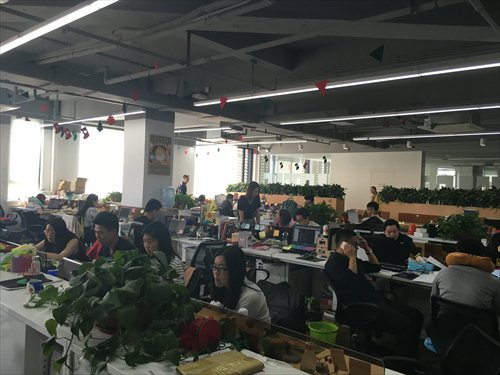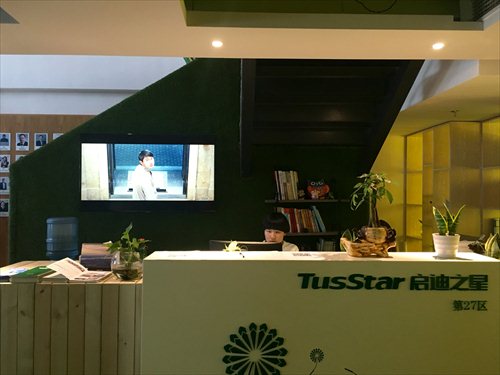HOME >> METRO SHANGHAI
Yangpu district replaces heavy industry with entrepreneurs
Source:Global Times Published: 2016-5-23 17:38:01

A giant hammock and 3D art at TusStar. Photo: Qu Xinyi/GT
Shanghai's Yangpu district was once famed as an industrial area with heavy industry factories and plants producing a vast range of products. But Yangpu no longer is a mecca for heavy industry and since the 1980s it has been encouraging innovation and entrepreneurial production.
According to the Science and Technology Commission of Shanghai Municipality, in 2015 there were 454 innovative service institutes established in Shanghai. After China boosted mass entrepreneurship and innovation, scores of incubators began to spring up. By January this year there were more than 400 "maker spaces" in the city.
Last week, the Global Times visited TusStar and Tencent Zhongchuang Space, two innovative centers in Yangpu district to talk to entrepreneurs there and find out how these "maker spaces" work.
Chen Wei and Zhao Hongyu are the founders of VUChannel, a startup company mostly involved in producing original videos. Their debut video was One Page, a 20-minute memorial for Tsinghua University's 105th anniversary. The video was aired on several major online video platforms on April 24 and attracted over 400,000 hits.

Entrepreneurs work at a business incubator in Yangpu district. Photo: Qu Xinyi/GT
Deep affection
Chen told the Global Times that this video was made to express their deep affection for their alma mater - Chen and her husband graduated from Tsinghua University 10 years ago. They worked for other companies for some eight years after graduating before they launched their own business.
"I used to work for Microsoft in Beijing, and my husband was a popular screenwriter and director on campus," Chen said. "But the Internet was still very young when we graduated and because of the economic and social atmosphere at the time, we decided not to start the business immediately."
They understood that the rapidly developing technology and commercial fields would eventually allow them to cross over to other areas and in 2014 they resigned from their jobs, drove around Europe for three months and then joined TusStar at the beginning of the year.
For Chen both the travel and the new business were exciting - nothing was predictable any longer and she found herself enjoying the freedom of the new career. "The most helpful thing was the resources from the incubator - they not only offered infrastructure like the office space but also advised on tax and finance, legal affairs, and copyright."
Although Chen and Zhao have taken their first steps, Chen thinks college students with similar ambitions should consider this carefully before starting their own businesses. "It would be great if they have a long-term plan and partnerships. But encouraging entrepreneurship does not mean that every graduate student needs to be an entrepreneur."

One of the offline bases of TusStar. Photo: Qu Xinyi/GT
Technological talents
The success of Yangpu's transition from an industrial district to an innovative center has been attributed largely to its social environment and cultural background. The presence of many higher education and research institutions like Fudan and Tongji universities means there is also a constant supply of technological talents.
Of the 13 university national science parks in Shanghai, Yangpu district has established seven.
Han Wei, the general manager of TusStar Shanghai said the company worked closely with the universities. "We run courses for entrepreneurs and current students while we continue to look for ideas and potential projects."
Han said the incubator now has more than 60 offline bases and handles around 2 billion yuan ($305 million) in venture capital investment from more than 300 businesses. Helped by Shanghai's international reputation the incubator has also worked with several international organizations like Swissnex China and the University of Washington.
"We think the future is people oriented, so, as well as capital and other kinds of support, we also have an R&D center called H-Lab, which looks after the happiness of the entrepreneurs," Han told the Global Times.
Inside the incubator's offices unexpected designs and adornments, like a giant hammock and 3D paintings, confront the visitors. "We focus on both fun and social values when decorating, trying to build a comfortable and ecological entrepreneurial atmosphere," Han said
Tencent Zhongchuang Space is another innovation center in Yangpu district, located in the core area of the Innovation and Entrepreneurship Block at Daxue Road. Although most businesses here are internet-related, the center does not restrict itself to IT business.
"We select programs with creativity and potential. Because the businesses settled here are diverse, our operations team needs to be diverse as well, so that we can offer support from different perspectives," said Li Ming, the operations manager for the Tencent Zhongchuang Space.
Li said the operations team usually sets a six-month limit to help entrepreneurs analyze and set goals. So theoretically there is a replacement mechanism, because in this way resources can be shared and used more flexibly.
"Compared with other districts in Shanghai, living in Yangpu is easier," Li said. "Many young people have no problems if they work overtime at night and have to find accommodation or meals."
At present Yangpu district has set aside about 23 square kilometers for innovation and entrepreneurial businesses, with nearly 2,000 projects launched and over 6,000 businesses being established.
The vice secretary of CPC Yangpu District Committee, Tang Haidong, said the glorious days of Yangpu as an industrial district have gone. "Because it is a central city area, it should mainly rely on tertiary industry, so the government keeps heading toward this goal." Tang said that the government had retained some of the old factory structures and kept their original appearance as a tribute to the city's industrial past and cultural heritage.
The municipal government has also been encouraging entrepreneurs and innovation. Tang said the Shanghai National People's Congress was the first one to introduce a fault tolerance mechanism, which means if entrepreneurs made mistakes because of external factors they cannot be legally held to be at fault.
A good environment
"Our society needs innovative spirits so we should be tolerant of failure, or there is no innovation," Tang said. "What the government is doing is building a good environment, including working environments and ecological environments and attracting entrepreneurs to come here to develop."
Xie Jiangang, head of the Yangpu District People's Government, Shanghai Municipality said there used to be too many regulations. If someone wanted to register a business, for instance, there could only be one business at one address. But after the regulations were modernized now several businesses can officially share an address.
In October, the Yangpu Online Governmental Affairs and Administrative Service Center will be opened to offer one-site acceptance, one-form applications and one-station service to save time and effort.
"We are very delighted that some college students have innovative ideas and the ambition to be entrepreneurs. But if they don't have the ability to do this immediately, I suggest they continue to study," Xie said. "And for those who haven't decided whether to start a business or not, we hope that they will be at least loyal workers."
This article was written by Qu Xinyi
Newspaper headline: From factories to the future
Posted in: Metro Shanghai, City Panorama